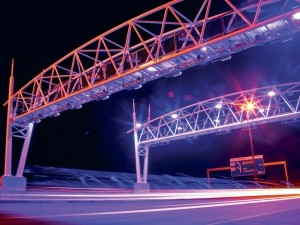
E-toll defaulters may start receiving civil summons from the South African Roads Agency (Sanral).
The roads agency announced yesterday it will over the "next few days" officially send out summons to motorists who refuse to settle their e-toll debt.
Sanral says the first set of civil summonses to individuals is being delivered by sheriffs in different jurisdictions in Gauteng.
Last month, Electronic Toll Collection (ETC), the company responsible for collecting e-toll payments, warned motorists not complying with the system should expect "intensified collection activity".
"The summonses will also include higher value summonses of mostly companies. Due to the amount owed in these cases, the summons has to be managed by the High Court," says Alex van Niekerk, project manager for the Gauteng Freeway Improvement Project.
According to the roads agency, since the introduction of the 60% discount of e-toll debt in November 2015, Sanral has made it clear it will also introduce a process of debt collection against serial defaulters.
"Sanral has a responsibility towards the country and the thousands of compliant vehicle owners who regularly pay their e-toll accounts to recover the outstanding debt from defaulters," says Van Niekerk.
"We have an obligation to act. The global ratings agencies and the investment community are also looking towards Sanral and expect from us to demonstrate our commitment to financial responsibility and high standards of corporate governance."
ETC COO Mark Ridgway says payment of e-tolls is a legal requirement and "any delinquency in this regard will be met with consequences".
In November last year, Sanral announced a 60% discount of e-toll debt run up between December 2013 and August last year. The discount is only valid until midnight on 2 May.
Earlier this month, Sanral announced toll fees on the inner Gauteng highways would be adjusted for inflation by 4.7% as from 11 March, the first e-toll adjustment since the inception of the scheme in December 2013.
Selective threats
Meanwhile, the Organisation Undoing Tax Abuse (Outa) says it notes with interest Sanral's latest round of threats to summon e-toll defaulters, "which is selective and confined to a civil claim against high value corporate organisations".
Outa notes that two years ago, Sanral sent out its first threats of criminal summons; however, that was put to bed when the roads agency realised it had no basis for criminalising e-toll defaulters whose case could be easily defended.
Sanral's decision to tackle the high-value, corporate defaulters, on the basis of a civil charge, is questionable, in that this angle is generally one taken on disputes of a contractual nature, Outa says.
It would appear then that companies and people who may, therefore, be at risk of a summons are those who have signed Sanral's e-toll contracts in the past and have now defaulted on these.
"However, even in this situation, we know that many businesses would have initially signed these agreements under duress of Sanral's initial threats of criminal prosecution and they will have a strong chance to defend their rights of ceasing to pay for the unjust e-toll scheme," the organisation says in a statement.
"We know of many businesses and individuals who have paid up and cancelled their agreements with Sanral and by doing so, have joined the other 80% to 90% of the road-users who are not paying," says Wayne Duvenage, chairperson of Outa.
"We estimate that between 60% and 70% of all Gauteng road-users have never signed up or ever paid. They have very valid arguments to defend themselves and we believe are not at risk."
Outa believes there can be no consensus for e-toll defaulters, "as there is no agreement between the parties and furthermore, if the road-user considers the premise for Sanral's one-sided agreement to be invalid due to the unlawful declaration of the roads as tolled roads, we fail to understand how Sanral can bring a civil claim against the road-users," says Duvenage.
"Furthermore, the fact that Sanral have determined the liability of the user in terms of their equipment that has not been approved, verified, certified and re-certified in South Africa in accordance with South African legislation, generates additional complications to Sanral's case, and Outa has plenty of evidence indicating the equipment is unreliable."
Share